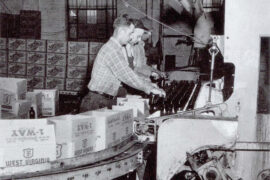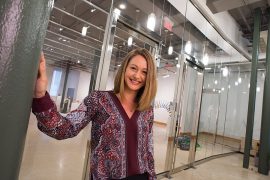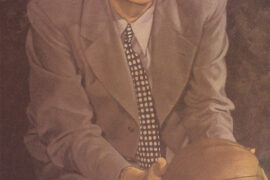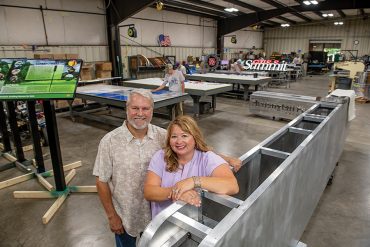By Jack Houvouras
HQ 1 | AUTUMN 1989
A typical Friday afternoon findsFirstHuntington National Bank C.E.O. A. Michael Perry engaged in yet another meeting -this time with local leaders including House Speaker Chuck Chambers, Marshall University President Dale Nitzschke and prominent businessman Marshall Reynolds, who assemble in Perry’s office in the late after- noon to discuss some of the many issues facing Huntington in the coming months. The meeting breaks up at 7:20 p.m. and another 12 hour business day is completed. It has been a productive day for Perry who now looks forward to the short drive home to his 200-acre farm in rural Wayne County. For Perry, 7:20 p.m. signals the beginning of a second life. Waiting just 10 minutes outside of the city are two of the most important things in that life – his wife and his home. And although Perry is regarded as one of the most powerful leaders in Huntington, he often can be found on his farm, after work, bailing hay or sheering sheep. As Perry says, “I am a number of different people … a banker, lawyer, farmer, and father.”
He grew up all over Huntington. Born in the East End, his family later moved to the South Side, later to the West End and then back to the South Side. As a young boy, Perry was an ideal student. He enjoyed athletics but lacked the physical attributes needed to play varsity sports.
“I was not what you would call robust,” said Perry, who stands only 5-feet 7- inches tall. “I didn’t weigh over 112 lbs. until I got out of law school.”
What Perry lacked on the athletic field he more than made up for in the classroom. Throughout his J 8 years in school, Perry was always at the top of his class. He credits his success to a number of teachers and a very simple philosophy.
“I was a worker,” he said. “I wasn’t a book-worm, but I always got my lessons done so I could spend time doing what I wanted in the evenings.”
It was in the fifth grade that young Perry came home from school one afternoon and informed his mother that he had met a girl who was just perfect for him. ‘Tm going to marry her,” he announced. He did just that 11 years later.
Henriella Mylar was the young girl that Mike Perry had so much in common with. She was different from the others girls he had met as a young boy. And although they would drift apart in the next seven years, there remained a subtle attraction between the two that resurfaced in high school. While rehearsing for a duet as part of a high school production in their senior year, Perry and Henriella spent long hours together in the music hall. At the time, both were dating other people. But, by the time rehearsals were over, so were their other relationships, and the two began dating.
He graduated with honors in 1954 from Huntington High School before attending Marshall University, where he also excelled academically. He continued dating Henriella through college, and upon graduation in 1958, fulfilled his prophecy from 11 years earlier when he married Henriella Mylar – the girl he said was ‘Just perfect for me.”
Perry an his new bride then left for Morgantown, where he began his studies at WVU Law School. He had opted to study law at the urging of his parents, two people very important in his life. “I was very fortunate to have gotten a lot of advice from my mother and father,” Perry said. “My father graduated from high school but my mother didn’t, although she is perhaps one of the best-read individuals I have ever encountered -self-taught.
“They recognized that I needed to do something beyond just college. My father’s idea was that by the time I got out of college, my college degree wouldn’t be any more valuable than his high school degree.”

With Perry and his wife settled into a small apartment near cam pus, Perry attended his first class – an experience he says he will never forget.
“In law school, the first professor would say to everyone, ‘Look to your right, look to your left, because you will not see them next year!’ That didn’t bother you until you turned to the right or left and saw some guy looking at you.”
While Perry was involved in the fierce competition of law school, Henriella was working on her undergraduate degree at WVU. When the first semester ended, the two returned to Huntington to spend Christmas with their families. For Perry, however, it was not a happy time.
“I was just miserable after the first semester,” he said. “I thought I hadn’t done well on my exams.”
With the Christmas season over, Perry and Henriella started back for Morgantown to face the second semester of study. But, along the way Perry’s insecurities about his final exams got the better of him. “I wasn’t even sure if I had done well enough to be invited back to law school,” he remembered. And so he stopped the car at the halfway point between Huntington and Morgan town, and called in to ask for his grades. Perry was stunned when the woman on the phone informed him he had finished first in his class-a ranking he would retain the next five semesters.
Fresh from the three-year challenge at law school, Perry began looking for work. As the top student in the 1961 law class at WVU, Perry was the recipient of a number of enticing offers – some from as far away as Florida and Texas. He was also offered the job of assistant attorney general of West Virginia, but, for reasons of his own, opted to go another route.
“Somewhere along the way, I realized the importance of where you want to raise children,” said Perry, the proud father of three children; Michele Blake, 28, who recently made Perry a grandfather for the first time with the birth of her daughter Rachael; Melanie, 24, who also lives on the farm in her own cabin; and a son Audy, 18, who will attend West Virginia Wesleyan this fall. “I didn’t have to go away very long to realize how much we have going for us around here as far as lifestyle.”
With his wife expecting their first child, Perry made the decision to remain in Huntington. He was quickly picked up by Amos Bolen and Jack Huddleston, two prominent attorneys working in town. Within five years, he was brought in as a partner in the law firm.

It was at this time that Mike Perry first entered the banking arena; a time that also saw him meet up with a young, ambitious entrepreneur by the name of Marshall Reynolds. Reynolds, as Perry would soon discover, was a straight-shooter with a mind for business that was unmatched by many.
Reynolds wanted to purchase some equipment from The First Huntington National Bank for his printing business, and, as legal council for the bank, it was Perry’s responsibility to draw up the contract. After the deal was finalized, Perry remembers receiving a phone call from what he thought to be a very rude Marshall Reynolds.
Reynolds admitted, point blank, that Perry had gotten the better of him in the contract, but his tone startled Perry.
“I don’t know what you’re talking about,” Perry responded.
“Oh Bull!,” Reynolds countered. “All I’m trying to do is pay you a compliment. Would you do as good a job for me as you did for the bank?”
From that phone conversation, a very special relationship was born. Reynolds was looking for someone sharp, someone insightful to advise him in future business deals. “He wanted me to evaluate an opportunity, but he told me, ‘Don’t tell me what to do and if you’re right, don’t rub it in.'”
Perry and Reynolds were an ideal match. As a lawyer, Perry was conservative, defensive. As a law student, he had been trained to uncover what could go wrong. Reynolds, on the other hand, was a hungry entrepreneur who had the natural inclination to take the offensive, to take chances and to make things happen. As Perry would later say, “I’ve always felt Marshall and I make an awfully good team. He’s the best offensive player that I’ve ever encountered.
“Looking back, I would have to say that was as good a personal relationship as I’ve ever had. Marshall is the kind of person who wants to share his success with others. I respect that in him.”
Meanwhile, unknown to Perry, Reynolds was taking the money he had made in the printing business and gobbling up huge blocks of stock in First Huntington National.Just years earlier, Reynolds had been turned down by the same bank for a $2,000 loan when he was starting his printing business. “I’ll own this damn bank one day,” he would say as he left the building in anger. Now, Reynolds was quickly on his way. to becoming the chief stockholder in the organization, and it was his intention to put his much-respected friend in the top office.
“I was very reluctant to leave the legal profession,” Perry said. “Hell, I was a lawyer, not a banker. It took me a while to go along with Marshall on this decision.”
In October of l981, Perry took over as the chairman of the First Huntington National Bank. He quickly went to work on overhauling many state banking laws by lobbying in the state Legislature for innovative reforms including the branch banking bill, the multi-bank holding company bill, and legislation that allowed for automated teller machines.
“I didn’t want the bank to be stagnant,” Perry said. “I told Marshall that if I were going to make this move, I wanted to be able to make a lot of changes in the banking industry.”
Perry did just that. With a new set of rules intact, First Huntington National Bank started a phenomenal ascent. Under the new holding name of KeyCenturion Bancshares, the bank grew from $200 million in assets in 1982 to $2.25 billion in 1989. Along the way, KeyCenturion brought in a number of West Virginia banks to its family and just recently, consummated the first interstate banking transaction with the First National Bank in Pikeville, Ky. Additionally, in 1986, the company went on the NASDAQ and went public, selling $17 million worth of stock.
“The role of banking is extremely important in the growth and development of a community,” Perry said. “Banks are the vehicles that take money from one group of people and loan it to another group to start a business, build a house, to educate their children. If all a bank does is take someones deposits and invest them in New York, then there is no money available to those people hoping to fulfill a dream.
“The men and women in our companies have been in the forefront of making sure that we’re doing these things. We recognize that the United Way, the Boys Club – they are all important because they show that you care.”
Despite the fact that Perry has experienced _an array of successes in his life, he remains, as many friends and colleagues will attest, quite humble. He is a man that is never thought of in a negative manner. It is nearly impossible to overhear someone speaking ill of his character. That, in essence, is perhaps his greatest success.
He is often described as being ‘very down to earth.’ The statement is laden with a great deal of truth. Many in Huntington know of A. Michael Perry the banker, the former standout attorney, the civic leader, the recipient of last year’s Citizen of the Year award presented by The Herald-Dispatch, but what few know is that when the working day ends, Perry retreats to another world just outside the city to assume the duties of a second life.
During the drive home, his mind is reeling from the Friday afternoon meeting with Chambers, Nitzschke and Reynolds, but now his focus shifts to his home, his farm, his wife. He is already planning, in his mind, what he will be teaching this week at Sunday school – he is a deeply religious man.
When he pulls into the driveway, Henriella is working in front of their home, a small renovated cabin, planting impatiens in the garden. They talk about each others’ day before Perry heads inside to change out of his suit and tie and into a pair of jeans, boots, and a plain white T-shirt. It’s already 7:50 p.m. and in one hour, it will be dark. Dinner will have to wait because this evening, Perry has more work that needs to be done. His pet project, an old barn he is renovating as a museum of sorts, needs attention. It is a project he has been working on for years. At some point, Perry began accumulating what many would consider junk – old washing machines from the early 20th century, antique farming tools and items from an old general store. He has taken each of these relics and restored them back to their original condition. But why?
He is an advocate of history, in particular our Appalachian heritage. To that end, Perry feels the need for us, as products of the past, to always remember where it is we came from. The museum that he puts much of his time and energy into is a symbol of his commitment to history and all we can learn from it. It is his dream to pass on the old barn, filled with an array of intriguing relics, to the children of this area so that they might learn what it was like to live in America before the advent of modern-day technology.
When Perry first moved to the farm in 1973, many thought he was crazy. One of Huntington’s most successful attorneys, he purchased a decrepit old cabin on a large farm in Wayne County and moved in. He and his wife slept in the living room for more than a year before the upstairs was renovated – work which he and Henriella did themselves.AsPerry points out, “There aren’t many women who would leave their southside home to move out to an old, rundown farm. My wife is someone truly special. I wouldn’t be where I am today without her.”
One of the first things he did after moving on the farm was to plow up the corn and potato fields and plant grass seed. “There goes the neighborhood,” one of the local farmers was heard to say.
Today, the cabin is a restored, comfortable home that has seen three children reared under its small roof. He has since planted several crops, purchased chickens, cows, sheep and other livestock. His neighbors are always ready to lend a hand.
“I think it’s important not to lose sight of our roots and knowing how to support ourselves from the earth,” Perry said. “If you take something out of the ground, you need to put it back in. That basic philosophy is what drives us to do what we do.

“That’s why I like being a part of those associations with Marshall Reynolds and others. It’s our way of giving back.”
Sitting on the steps leading to his home, Perry has finally completed a days work. He is now able to put aside thoughts of the bank and farm and begins to talk of his last great interest- his hometown. He is one of Huntington’s greatest advocates.
“We have a number of strengths in Huntington. We are within 500 miles of 60 percent of the entire population of the United States, we are situated next to a major water thoroughfare in the Ohio River, we have the lowest crime rate in America, one of our greatest resources can be found in Marshall University, our health care is superb, the cultural opportunities are abundant and we are blessed with a productive, hardworking population.”
Among the things that Perry would like to see in the future for Huntington include good manufacturing jobs, development of the SuperBlock shopping mall, and transforming this area into a retirement community.
“This city and this state have so much to offer,” he said. “In West Virginia, we have four distinct, beautiful seasons. There is first-class snow skiing and whitewater rafting close by. We’re big enough and small enough; and in West Virginia, it is possible for a person to feel like he or she can make a difference.”
Mike Perry’s modesty is well-known. Although he is regarded as one of Huntington’s most respected, effective leaders, he insists he isn’t any different from the next guy.
“I’m not any smarter … I suddenly haven’t been imbued with a burst of new intelligence or insights … but I have been afforded an opportunity to be in a position of some influence where you can at least try to make a difference.” He has done just that.
Marshall Reynolds, Perry’s closest friend, likes to tell his story of the time he first met the young attorney.
“I remember that Mike was telling me about all the things he wanted to do in Huntington. ‘You’ll never do it,’ I told him.”
“Why not?” Perry responded.
“Because you ‘re too short,” Reynolds said sarcastically.
“Damn it, that’s not true, Reynolds,” Perry joked back. ‘Tm an inch taller than GiGi Narcise.”
But, judging by the way Marshall Reynolds regards his best friend, and by the respect he commands in the community, not many men stand taller in Huntington than A. Michael Perry.





